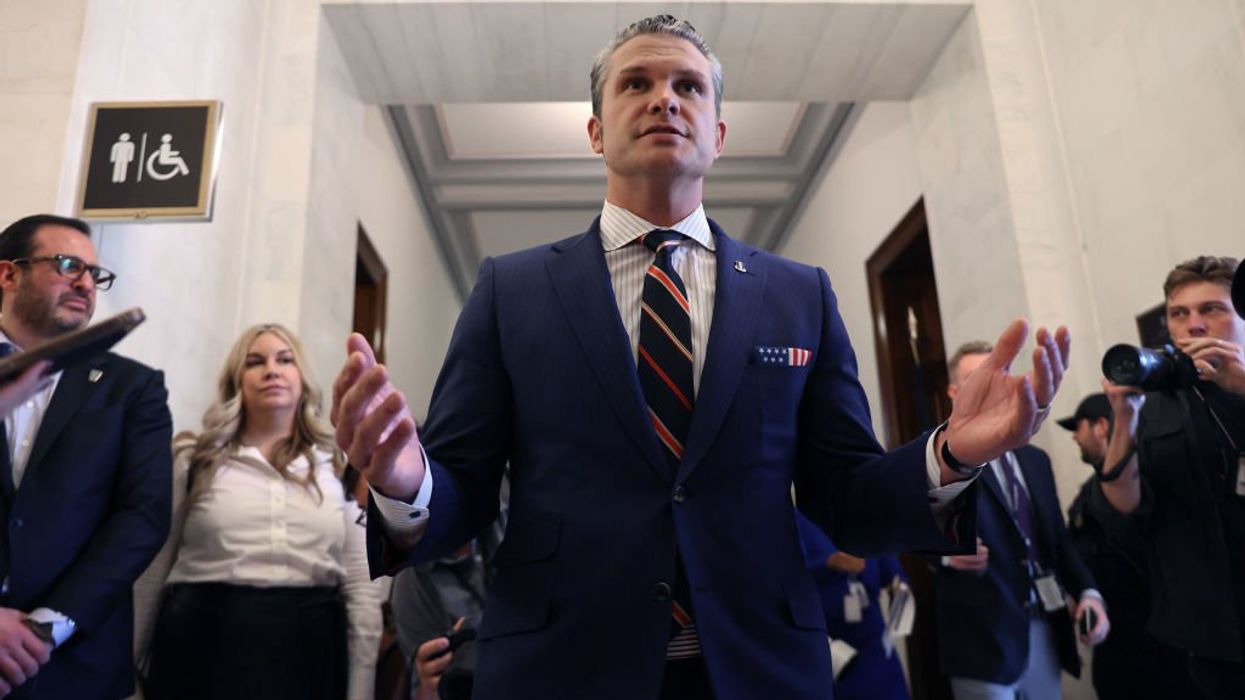
© 2024 Blaze Media LLC. All rights reserved.
MSNBC host sees secret 'socialist' behind Margaret Thatcher's conservative facade
April 09, 2013
Everything we know about the life and legacy of Margaret Thatcher is a lie -- this according to MSNBC host (and self-described socialist) Lawrence O'Donnell. In actuality, O'Donnell says,' Thatcher was actually... a socialist.
Based on some carefully spliced audio & video snippets from Thatcher's long political career (one speech in particular), O'Donnell feels confident in characterizing the Iron Lady as being twice as socialist as Barack Obama:
"Barack Obama is half the taxer that Margaret Thatcher was, half the socialist that Margaret Thatcher was," O'Donnell declared Monday evening. "President Obama hasn't dared propose a health care program as purely socialistic as Margaret Thatcher's health care system, the one she supported and bragged about. But Republicans call Barack Obama a 'socialist' as if it is an epithet, and call Margaret Thatcher a 'hero.'"
Yep. Apparently we've all been duped. Margaret Thatcher is a socialist and Barack Obama is actually a conservati...
Bwaaaahahahahahahahaha! I'm sorry, I just can't even write that.
Here's O'Donnell's take (h/t Mediaite):
And now for some context on Lady Thatcher's remarks -- bold phrases are the parts O'Donnell highlighted.
On health care:
Of course we welcome the growth of private health insurance. There is no contradiction between that and supporting the National Health Service. It brings in more money, it helps to reduce the waiting lists, and it stimulates new treatments and techniques. But let me make one thing absolutely clear. The National Health Service is safe with us. [applause] As I said in the House of Commons on December 1 last: “The principle that adequate health care should be provided for all, regardless of ability to pay, must be the foundation of any arrangements for financing the Health Service.” We stand by that.
Next month the old-age pension will go up by 11 per cent., and that despite the worst recession since the 1930s. That is some achievement too. Whatever our difficulties, nine million pensioners have been fully protected from inflation. We gave our promise and we've kept it.But we do not measure our success merely by how much money the Government spends. The well-being of our people is about far more than the welfare state. It is about self reliance, family help, voluntary help as well as State provision. In a society which is truly healthy responsibility is shared and help is mutual. Wherever we can we shall extend the opportunity for personal ownership and the self-respect that goes with it. Three hundred and seventy thousand families have now bought their own homes from councils, new towns and housing associations. That's the result of this Government's housing policy carried through in the teeth of opposition from the Labour Party. We have fought them all the way, and we won. Half a million more people will now live and grow up as freeholders with a real stake in the country and with something to pass on to their children. There is no prouder word in our history than “freeholder”.
Mr. President, this is the largest transfer of assets from the State to the family in British history and it was done by a Conservative Government. And this really will be an irreversible shift of power to the people. The Labour Party may huff and puff about putting a stop to the sale of council houses. They may go on making life unpleasant for those who try to take advantage of their legal rights, and what a wicked thing it is to do that. But they do not dare pledge themselves to take those houses back because they know we are right, because they know it is what the people want. And besides, they would be making too many of their own councillors homeless, not to mention one or two of their MPs.
May I assure the hon Gentleman that I shall deal with the economy in a moment? Perhaps he would take his time. In the meantime, I shall deal with some of the things said by the Leader of the Opposition. I had not proposed to deal with them in my speech but I had better deal with them now. The right hon. Gentleman spoke about the National Health Service but omitted to point out that for every £1 that Labour spent on the Health Service, this Government have spent £3. He omitted to mention that we achieved economic growth at a faster rate than our European competitors and that under a Conservative Government that resulted in an all-time record for the number of people in jobs.
Again and again Tory Governments took the lead; in extending unemployment insurance, in providing compensation for past industrial injury and disease and in bringing in training schemes for the future.In the declining industries we have made available compensation on a uniquely generous scale for those who have had to lose their jobs. Let no one accuse this party or this Government of failing to care about the unemployed. This Government has also taken two very far-reaching steps to see that Britain is never again left unprepared for technological change. Our youth training scheme is the most imaginative in the western world and when it is well under way every 16-year-old will have the choice either to stay on at school or to find a job or to receive training. At that age, unemployment should not be an option. That is our objective.
We are responding to the needs of industry by reintroducing technical training into our schools—and not a moment too soon. This Government is building for the future. We all want a higher standard of living, as individuals and as a community. The same is true in other countries. The challenge we face is not one of sharing out the limited amount of work—like spreading butter thinly on a slice of bread. It is how to translate our wants and aspirations into work to be done by our people. It is by producing what people want to buy that unemployment will be solved.
On evolution and global warming (HEAVILY spliced and reorganized):
Mr President, the evidence is there. The damage is being done. What do we, the International Community, do about it?In some areas, the action required is primarily for individual nations or groups of nations to take.
I am thinking for example of action to deal with pollution of rivers—and many of us now see the fish back in rivers from which they had disappeared. I am thinking of action to improve agricultural methods—good husbandry which ploughs back nourishment into the soil rather than the cut-and-burn which has damaged and degraded so much land in some parts of the world. And I am thinking of the use of nuclear power which—despite the attitude of so-called greens—is the most environmentally safe form of energy.
But the problem of global climate change is one that affects us all and action will only be effective if it is taken at the international level.It is no good squabbling over who is responsible or who should pay. Whole areas of our planet could be subject to drought and starvation if the pattern of rains and monsoons were to change as a result of the destruction of forests and the accumulation of greenhouse gases.
We have to look forward not backward and we shall only succeed in dealing with the problems through a vast international, co-operative effort.
Before we act, we need the best possible scientific assessment: otherwise we risk making matters worse. We must use science to cast a light ahead, so that we can move step by step in the right direction.
[...]
But a framework is not enough. It will need to be filled out with specific undertakings, or protocols in diplomatic language, on the different aspects of climate change.
These protocols must be binding and there must be effective regimes to supervise and monitor their application. Otherwise those nations which accept and abide by environmental agreements, thus adding to their industrial costs, will lose out competitively to those who do not.
The negotiation of some of these protocols will undoubtedly be difficult. And no issue will be more contentious than the need to control emissions of carbon dioxide, the major contributor—apart from water vapour—to the greenhouse effect.
We can't just do nothing. But the measures we take must be based on sound scientific analysis of the effect of the different gases and the ways in which these can be reduced. In the past there has been a tendency to solve one problem at the expense of making others worse.
[...]
We need a realistic programme of action and an equally realistic timetable.
Each country has to contribute, and those countries who are industrialised must contribute more to help those who are not.
The work ahead will be long and exacting. We should embark on it hopeful of success, not fearful of failure.
What we are now doing to the world, by degrading the land surfaces, by polluting the waters and by adding greenhouse gases to the air at an unprecedented rate—all this is new in the experience of the earth. It is mankind and his activities which are changing the environment of our planet in damaging and dangerous ways.
We can find examples in the past. Indeed we may well conclude that it was the silting up of the River Euphrates which drove man out of the Garden of Eden.
And O'Donnell's accusation that Thatcher was "anti-gay" included a snippet of her remarks on priorities in education:
To compete successfully in tomorrow's world—against Japan, Germany and the United States—we need well-educated, well-trained, creative young people. Because if education is backward today, national performance will be backward tomorrow. But it's the plight of individual boys and girls which worries me most. Too often, our children don't get the education they need—the education they deserve.And in the inner cities—where youngsters must have a decent education if they are to have a better future—that opportunity is all too often snatched from them by hard left education authorities and extremist teachers. And children who need to be able to count and multiply are learning anti-racist mathematics—whatever that may be.
Children who need to be able to express themselves in clear English are being taught political slogans. Children who need to be taught to respect traditional moral values are being taught that they have an inalienable right to be gay. And children who need encouragement—and children do so much need encouragement—so many children—they are being taught that our society offers them no future. All of those children are being cheated of a sound start in life—yes cheated.
Of course—in the country as a whole—there are plenty of excellent teachers and successful schools. And in every good school, and every good teacher, is a reminder of what too many young people are denied.
I believe that government must take the primary responsibility for setting standards for the education of our children. And that's why we are establishing a national curriculum for basic subjects.
Finally, here's George Will's column O'Donnell referenced: Margaret Thatcher's Vigorous Virtues.
For more of Margaret Thatcher's speeches and remarks, visit the Margaret Thatcher Foundation website.
Want to leave a tip?
We answer to you. Help keep our content free of advertisers and big tech censorship by leaving a tip today.
Want to join the conversation?
Already a subscriber?
more stories
Sign up for the Blaze newsletter
By signing up, you agree to our Privacy Policy and Terms of Use, and agree to receive content that may sometimes include advertisements. You may opt out at any time.
© 2024 Blaze Media LLC. All rights reserved.
Get the stories that matter most delivered directly to your inbox.
By signing up, you agree to our Privacy Policy and Terms of Use, and agree to receive content that may sometimes include advertisements. You may opt out at any time.


